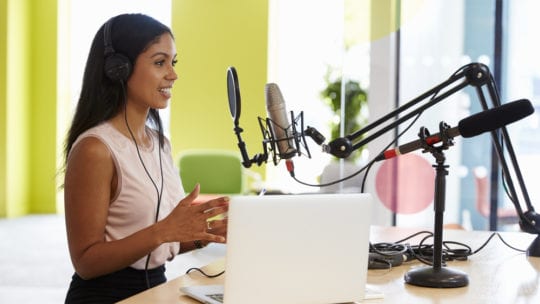

With the novel coronavirus pandemic running afoot, launching a podcast may be one of the furthest things from a communicator’s mind. Or is it?
During the virus lock-down, fewer people are commuting to work. As most podcast listening occurs during commutes, podcast listening is in decline at the moment. Downloads worldwide dropped about 10 percent since the start of March, according to data from Podtrac. Total unique listeners dropped some 20 percent.
Podtrac says US audiences for podcasts fell 8 percent during the week of March 15. Each topic that Podtrac follows (news, sports, comedy, society and culture, and true crime) is down since March 9. News, the most listened-to topic, fell 10 percent. True Crime, a growth engine, is off nearly 30 percent since early March. Comedy is down 15 percent.
Those staying home are turning to cable and online news mostly. Traffic at news sites is up 30-40 percent. Nielsen ratings for CNN are up almost 200 percent; Fox News is up nearly 100 percent, with MSNBC rising about 60 percent.
Podcasting’s Moment?
Still, podcasting is booming as a category. Apple lists nearly 600,000; additions are announced almost daily. Moreover, at this moment people are worried about health, health insurance, jobs and the future. They’re clamoring to learn as much as possible to protect themselves and their families. Podcasting could prove a valuable resource. In addition, the public is seeking entertainment and a sense of community. Brand podcasts can fill this need.
While organizations have their preferred methods of distributing messages to audiences, some are turning to podcasts for more comprehensive discussions around necessary information.
Audio as a medium for distributing information is certainly not new; instantly accessible technology allows for anyone to create his or her own show, and communicators are noticing.
What’s Working
Recently, publishers have found success creating podcasts that cover specific issues and granular topics. Election-focused podcasts, such as FiveThirtyEight’s “Politics” and Slate’s “Political Gabfest,” deal with constituent issues. Sports-themed podcasts leapt from the radio airwaves to center on everything from fantasy football to Premier League soccer, including “Pardon My Take” by Barstool Sports and “Football Weekly” from The Guardian, which led the way toward growth of themed podcasts.
Some of the newest series, of course, focus on the pandemic. Examples include CNN’s “Coronavirus: Fact vs. Fiction,” which launched in late February, and BBC World News’ daily, “Coronavirus Global Update.” Inside Radio reports that one quarter of all news podcasts are entirely coronavirus-focused.
The success of brand podcasts is seen in other sectors beyond news. Mayo Clinic, one of the foremost institutions for medical content, hosts 12 podcasts on its website. These include everything from simple medical Q&A to employee experiences and surgical insights. Mayo Clinic also released a mini-series for those searching for the latest on COVID-19.
In 2018, McDonald’s responded to a crisis surrounding a botched launch of Szechuan sauce with a three-episode series podcast, titled “The Sauce.” McDonald’s enlisted the help of Studio@Gizmodo and Onion Labs for the podcast. It peaked at No. 94 on the iTunes 100 podcast chart 24 hours after its release.
The condiment, which debuted in 1998 as part of a Disney promotion for the film “Mulan,” returned to the forefront after it was featured in a television episode of “Rick and Morty” in early 2017. McDonald’s decided to capitalize on the fervor and resurrect the sauce for one day, but it quickly ran out of supply.
McDonald’s decided a satirical true crime-themed podcast would playfully address the issue.
Launching a Podcast During the Pandemic
While news publishers and healthcare providers may find a podcast a useful information tool during the COVID-19 outbreak, some brand communicators might think differently.
Jered Martin, co-founder and chief operations officer at OnePitch, a platform designed to help connect PR pros and technology journalists, went full speed ahead to launch the second season of “Coffee with a Journalist,” which features editors and reporters from top-tier newsrooms in discussion about journalists’ lives and careers.
After the success of its first season, the team was eager to get a second one in the works. Martin and his team started planning for season 2 in fall 2019.
“We were skeptical about launching in the middle of the COVID crisis,” Martin said in an interview. “Some of our episodes are pre-recorded and didn’t touch on the news that’s consumed us over the past month.” Martin says the podcast transitioned the way it records the show. “Now we’re recording with new guests weekly and touching on current events as part of a new segment.”
While Martin and his team were somewhat unsure about timing, they decided to move forward with the launch.
The show’s goal is “to inform our listeners about each unique guest who joins us,” Martin said. “The individuals who recorded with us need a platform to get their names out there and their stories read.”
In addition, the team “want[ed] to give our listeners something new and fresh to listen to…We realize, in general, it’s a sensitive time to talk about things. For us, the hope is that our listeners will find enjoyment in each episode and gain insight into journalists that many of them are familiar with.”
Tools to Start and Expand
If you think a podcast is the right vehicle for your message, there are many free, accessible tools to get you started.
Anchor bills itself as a one-stop platform where users create, distribute and monetize podcasts from any device for free. It recently launched additional capabilities to make it easier for podcasters to record and conduct remote podcasts and interviews via Record With Friends 2.0.
There’s also Spotify for Podcasters, which gives users a chance to see data such as listeners’ musical tastes, age, gender, location and how long they listened to a particular episode. It also features an accompanying blog with interviews and tips for starting a podcast.
And for podcasting beginners interested in the craft, one recommendation is Gimlet Academy, a five-part podcast series from podcast pioneer and Gimlet Media co-founder Alex Blumberg, which dives into how best to make your audio stories more compelling.
While the technology is ripe, communicators are urged not to underestimate how much time and work it takes to make something that will hold an audience’s attention (see sidebar).
A tip: Consider what it is that only you can offer and the best way to speak directly and honestly to a community that matters to you.
CONTACT: nschuman@prnewsonline.com
Podcast Creation for an Army of One
Many readers are one-person PR teams. We asked Robert Johnson, partner at RIESTER Public Affairs and co-host of the PR Nation’s podcast, to discuss his Questions to Ask Before Starting a Podcast.
1. Objective: Make sure you know why you are doing a podcast. Is it to build media relations? Communicate to your audience without a filter? Whatever the reason, make sure you have one.
2.Audience: Do you have a way to reach people interested in your message, product or service? I’s much easier to grow listenership if you have a list to promote your podcast. This can be an email database, social media following or a membership list.
3. Message: Consider whether you have something interesting to say, not just once, but often. Make a list of stories you think might be interesting to the listeners. If you can’t think of any, then podcasting isn’t your medium.
4. Format: What kind of show are you hearing in your head? Do you think your stories are better suited to a news-style show, with a focus on guest interviews? Or are you or an executive at your company interesting enough that a solo show would captivate the masses?
5. Commitment: Do you have enough time? If you’re a PR army of one, you will do everything, from formatting the look and sound, to booking guests, conducting research and interviews, and editing the final product. Expect a monthly show to take 40-50 hours to produce—or more, if you are a novice.
6. Talent: Do you have the skills to gather, package and present your stories? Are you an extrovert? Do you like people? Are you naturally curious? These are the personality traits that work best for podcast hosts.
7. Patience: What is your timeline? It takes time to grow an audience for a show, even if you have lists to promote it. Some podcasts publish every week for an entire year before they start to catch on with listeners.
8. Economics: Do you have funding to support production? How about money to buy equipment? You may need to purchase good microphones, a mixer that can connect to your laptop and mobile phone and software to record and edit. A good set-up will cost about $1,000 or more, depending on several other factors, including the number of guests on each podcast. In addition, factor in about $100-$200 per month for the connection, editing and hosting subscriptions necessary to support production. Don’t forget a website and social media channels. Even if the platforms are free, good content is not.
